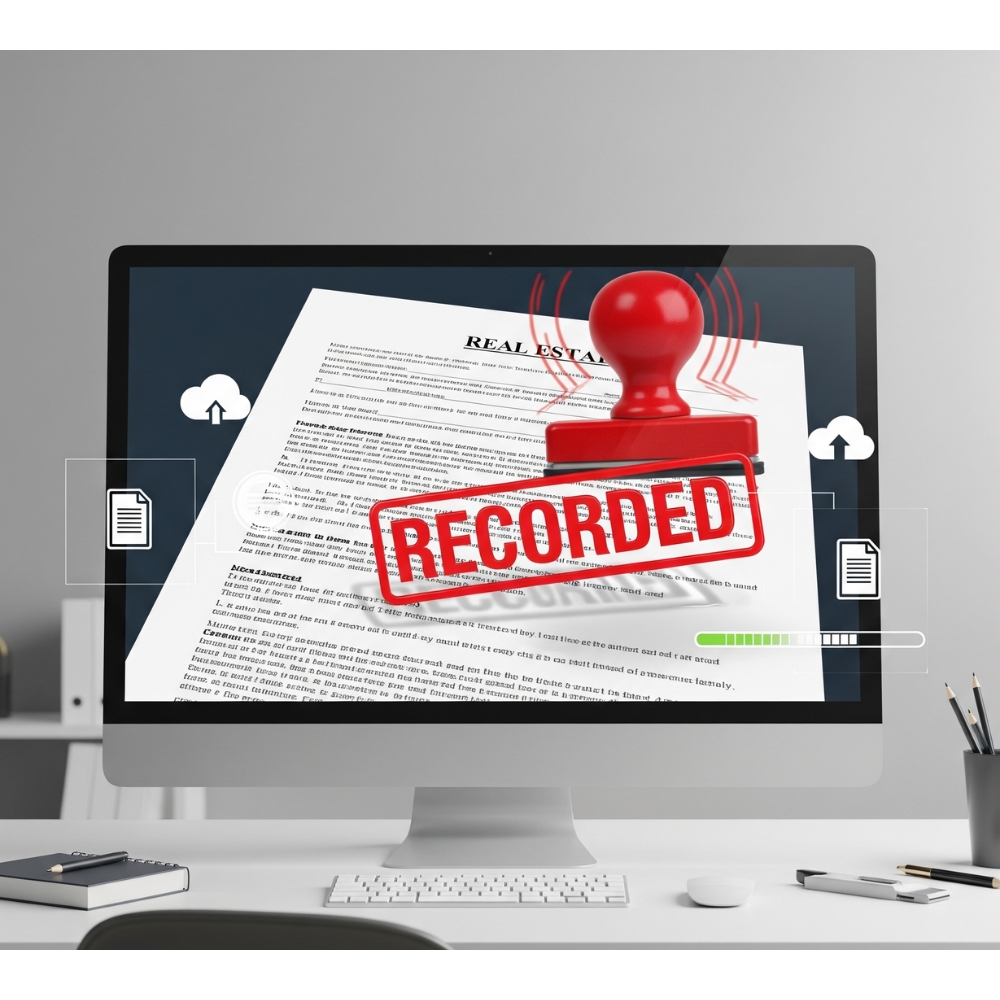In today’s fast-paced digital world, traditional paperwork is gradually being replaced with more efficient, electronic solutions—and the real estate and legal industries are no exception. One of the most transformative changes in these sectors is the rise of e-recording services. Whether you’re a title company, a law firm, or a real estate professional, understanding the e-recording fees and costs in California is crucial to staying compliant and competitive.
But what exactly is e-recording, and how do its fees work? Let’s break it down so you can make informed choices for your business or personal needs.
What Is E-Recording?
E-recording (short for electronic recording) is the digital process of submitting, receiving, and recording documents with a county recorder’s office. Instead of mailing or delivering documents in person, professionals can now upload them through secure online platforms.
This process has revolutionised the way real estate transactions, deeds, liens, and other legal documents are handled across California.
Benefits of E-Recording:
- Speed: Documents can be recorded in minutes or hours instead of days.
- Accuracy: Fewer chances for lost or damaged documents.
- Convenience: No need to travel to county offices or stand in line.
- Transparency: Receive real-time confirmation and tracking of documents.
Why E-Recording Fees Matter
While e-recording is a major time-saver, it’s essential to understand that there are associated fees that vary depending on several factors:
- The county in which you’re recording.
- The type of document being submitted.
- The volume of documents.
- The e-recording company you choose.
Understanding these costs helps professionals budget accurately and avoid unexpected charges.
Types of E-Recording Fees in California
Let’s explore the key fees you might encounter when using e-recording services in California.
1. County Recorder Fees
Each county in California sets its fee schedule for document recording. These are standard charges applied regardless of how you submit the document (electronically or physically).
Examples of common county fees:
- Deeds: $14 to $20 (per first page)
- Reconveyances: $15 to $19
- Liens: $15 to $25
- Each additional page: $3 to $5
Note: Some counties may add surcharges for real estate transaction filings, such as the $75 Building Homes and Jobs Act fee (Senate Bill 2), unless exemptions apply.
2. E-Recording Submission Fees
These are additional charges imposed by the e-recording companies or platforms facilitating the electronic submission.
Typical submission fees range from:
- $5 to $15 per document, depending on the service provider.
- Some platforms charge a flat monthly rate for high-volume users.
3. Service Provider or Convenience Fees
If you’re working with a third-party company like Countrywide Process, you may encounter a small processing or handling fee to cover service logistics, software usage, and technical support.
However, these fees often pay for themselves in saved time, fuel costs, and administrative hassle.
Are E-Recording Costs Worth It?
In short: Absolutely.
While there are upfront fees, the time and cost savings from not having to mail, scan, or travel to deliver documents outweigh the expenses. Here’s why many legal and real estate professionals in California consider e-recording services an essential part of doing business:
Consider These Savings:
- No courier or mailing costs
- Faster turnaround on recorded documents
- Fewer document rejections due to pre-submission checks
- Improved workflow and productivity
In the end, what you spend on e-recording services often equates to greater long-term efficiency and reduced operational overhead.
What Influences the Cost of E-Recording?
Let’s take a closer look at the factors that influence your final cost when using an e-recording company in California:
1. Document Volume
If you record documents frequently (e.g., a title agency or attorney’s office), some providers offer volume discounts or flat monthly pricing.
2. County Variations
Because California has 58 counties, each with its fee schedule and e-recording timeline, costs can vary significantly. For example:
- Los Angeles County might charge more for additional pages or require different tax documentation than Butte County.
3. Document Type
Some documents (e.g., deeds involving transfer tax) may trigger additional regulatory or tax-related charges.
4. Service Provider Rates
Each e-recording company sets its pricing model. Some may charge per page, others per document, and some offer monthly plans.
How Countrywide Process Makes E-Recording Easier
At Countrywide Process, we understand the complexity behind e-recording, especially in a state as diverse as California. That’s why we provide fast, secure, and cost-effective e-recording services tailored to your needs.
Here’s what sets us apart:
- Partnerships with all 58 California counties
- Transparent pricing—no hidden fees
- Real-time tracking and support
- Volume-friendly solutions for law firms, escrow offices, and more
- Dedicated customer service for complex or urgent filings
Whether you’re filing a single lien or hundreds of deed transfers per month, we streamline the process from start to finish.
Tips to Keep E-Recording Costs Down
Want to make the most of e-recording without overspending? Follow these best practices:
- Review county fee schedules before submitting documents.
- Bundle documents where possible to reduce per-document charges.
- Use standardised forms to avoid rejections and resubmission costs.
- Work with a trusted e-recording company that offers transparent pricing.
- Check for exemptions to avoid unnecessary fees (e.g., SB2 exemptions).
Common Questions About E-Recording Costs
Q: Are e-recording fees tax-deductible for businesses?
A: In many cases, yes. If e-recording is part of your business operations, it may be a deductible business expense. Consult your accountant for specifics.
Q: Do all counties in California support e-recording?
A: Most do, but capabilities and accepted document types vary. Countrywide Process ensures you’re filing with a county that supports e-recording.
Q: Is it more expensive to e-record compared to traditional recording?
A: Generally, it’s slightly more expensive per transaction, but the overall savings in time, efficiency, and reduced errors make e-recording more cost-effective in the long run.
Final Thoughts
E-recording is no longer a luxury—it’s a necessity in today’s real estate and legal industries. While the fees may vary depending on county and provider, understanding the structure of e-recording services and related costs can help you make smart, informed decisions.
With the right partner, like Countrywide Process, you can enjoy a seamless, transparent, and affordable experience, no matter where in California you’re recording.





